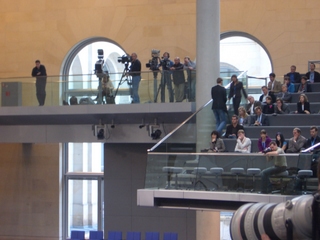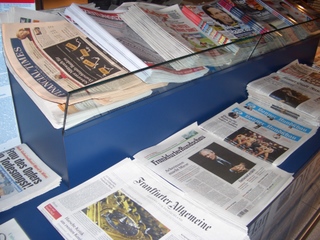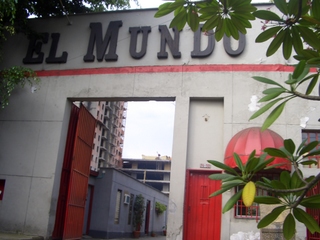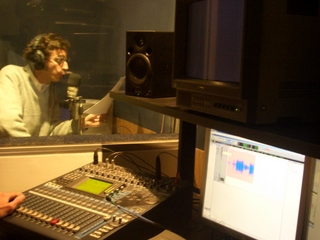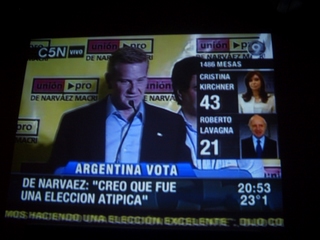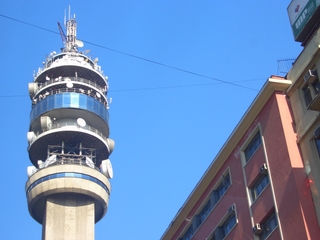Insufficient Press Freedom in South Eastern Europe
Over the last few years, the states of South East Europe (SEE) have developed in very different ways: Bulgaria and Romania are members of the EU – but were chastised by the EU in 2008, because areas like security, rule of law and the combating of corruption had been slow in developing. Croatia has a good chance of joining the Union in the near future – despite the unrest of this year. The same applies to Montenegro and Macedonia. In contrast the situation in Bosnia-Herzegovina is very unstable under the surface. In Serbia two roughly similarly large blocs of the population are fighting for the future course of the country: closer contacts with the EU or confrontation with the West with the support of Russia. The declaration of independence in Kosovo has hardened the fronts once more. In addition the new republic is also showing itself to be a highly fragile entity internally as well because of the continuing conflicts between ethnic Albanians and various different minorities (Serbs, Roma, among others). Albania itself – involved in the conflicts of the region because of the ethnic Albanian populations in Kosovo und Macedonia – is still being held back in its development because of poverty, corruption and organized crime.
If the problems and conflicts that have led to the outbreak of violence and wars in the region are truly to be overcome, the understanding of the various states and peoples for each other must be (re-)awakened. The people of the region must recognize that they have common interests (peace, security, economic development, integration into the EU), that they can learn from one another (reconstruction, democratization) and that they can only solve together the many problems which do not stop at their borders (environmental protection, organized crime). But even among journalists, prejudices, negative emotions, and sometimes even hate towards people of different cultural/ethnical origin are widely spread. In the media, minorities or neighbouring countries are often held responsible for negative developments instead of criticizing one’s own shortcomings, as for instance pointed out in one of the last news items of the Vienna-based South East Europe Media Organisation (SEEMO), an affiliate of the International Press Institute (IPI) on 30 July 2009. Many people in South East Europe still use the war or historical events (that suit them) as an excuse to avoid truly working towards changes in the present situation. Journalists of differing nationality often talk about each other rather than to each other.

Surroundings of Plovdiv - one of the oldest cities in Europe. Photo: D. Förger
Unfortunately a deterioration in the general situation in the area of the media has become apparent: Not only do the “Freedom House”, the “International Research and Exchange Board”, the “European Journalism Centre” and the “Committee to Protect Journalists” call attention to the substantial deficits in freedom for the media; if one considers the current “World Press Freedom Index 2008” of “Reporters without Borders”, on the whole a negative tendency becomes apparent (even when one views the sources critically). Bulgaria actually plunged from position 35 (2006) via 51 (2007) to 59 (2008) ‑ and now stands in the last place in the EU. “The government has not yet been successful there in curbing corruption and violence. Journalists live in constant fear of attacks from the political and criminal sectors”, the report stated explicitly. According to certain reports from colleagues (which have not yet met with much recognition internationally) the safety of journalists appears to be even more at risk in Moldavia than in the rest of SEE.
That all these negative judgments are not happening by chance, can be seen among other things from the increasing number of attacks on journalists and “people of the media scene” in South East Europe. The latter group includes colleagues who work on the one hand as reporters or journalistic book authors but who it is said also have their own contacts to dubious circles. Here the dividing line between “journalistic connections” for the purpose of research and one’s own involvement are fluid. An example of this is Ognjan Stefanov who was the victim of an extremely brutal attack in Sofia on 23 September 2008. Stefanov was editor-in-chief of the news portal “Frognews”, but his name was also cited by many newspapers in connection with the website “Opasnite Novini” (‘dangerous news’) that contained explosive news about members of the government and the secret services.
![2008[1].7 - Kopriwstiza (6) Journalists investigating environmental issues in Bulgaria](http://mediamdg.spreadlab.de/wp-content/uploads/2009/08/20081.7-Kopriwstiza-61-150x150.jpg)
Journalists investigating environmental issues in Bulgaria. Photo: D. Förger
Corruption and cronyism reinforce each other – and here the media are no exception. In expert circles people are saying on the quiet that unwelcome research and articles can be prevented by “non-cash benefits” (such as free invitations to luxury hotels) or the payment of a sum of money. Strong political pressure on journalists is especially likely during elections.
What is important in this connection is the following: in the Balkan areas it is still often unclear who the owners of the specific media are. Even if particular persons are presented to the public, they are usually only puppets in the hands of the real owners, who for their part represent particular political parties, large-scale economic groups (that mostly also have political interests) or criminal syndicates.
Hence the media are in general only in a limited position to fulfil their mandate as the “Fourth Estate”. An analysis of the media landscape in South East Europe, carried out by the Access Foundation in Sofia, calls attention to the substantial political and economic lack of independence of the media. This is complemented by the weak position of journalists vis-à-vis media owners and the absence of a well-developed investigative journalism as well as journalistic self-censorship. At the same time however it is hardly possible to identify a single person responsible for the situation; rather it is a question of the failure of all relevant sectors: of the media, politics and the constitutional state.
Dr Dirk Förger (49) studied biology, acquired a journalistic education and worked as a scientific editor for leading German and international media like “Die Welt”. He has longterm experience in TV and radio (i.e. German national broadcasting house ARD). Förger has been PR-manager in major industrial enterprises and associations and a lecturer on the media, journalism and PR at the universities of Heidelberg, Mainz, Münster, Munich, Zagreb, Dubrovnik, Belgrade and Sofia. At the moment he is heading the Media Programme for South East Europe of the Konrad Adenauer Stiftung.
Next Blog:
Thomas Deve, UNDP, Zimbabwe/Africa, journalist, policy analyst, board member of the Media Institute of Southern Africa (MISA), former online editor of the country’s daily newspaper, The Daily News.



